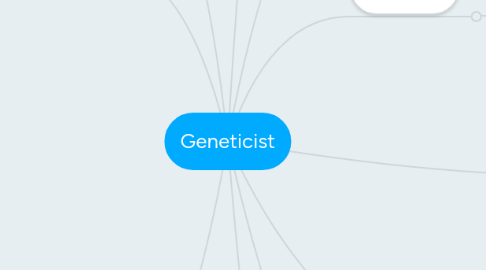
1. Brief preview
1.1. Genetics
1.1.1. Field in biology; studies:
1.1.1.1. Genes & Heredity
1.1.1.2. Genetic variation
1.1.1.2.1. How genes mutilate
1.1.1.2.2. How genes are involved in aging and disease
1.1.2. Environmental genetics
1.1.2.1. Environmental factors
1.1.2.1.1. Enhance the adaptation of a species to its environment
1.1.2.1.2. Interact with genes to cause disease
1.2. Geneticist: A scientist who studies genes. How are genes...
1.2.1. Mutilated
1.2.2. Activated
1.2.3. Deactivated
1.2.4. Inherited
1.2.5. The role genes play in disease and health
1.3. Environmental geneticists
1.3.1. interactions between genes and environmental factors => adverse health effects, disease, and aging
2. Interested?
2.1. pursue a major in genetics, biology or environmental science,
2.2. Courses to take
2.2.1. biology, ecology, chemistry, math, statistics, and computer science.
2.3. Bachelor's degree sufficient for entry-level jobs. Advancement and long-term research prospects will require advanced study and continued professional development.
3. Famous geneticists
3.1. James D Watson
3.2. Barbara McClintock
3.3. Michael S Brown
4. What does a geneticist do?
4.1. study the inheritance of traits at the molecular, organism, or population level
4.2. treat genetic disorders
4.3. Not to be confused with genetic engineers...use molecular tools to rearrange fragments of DNA to remove or add elements of an organism's genetic makeup, or even transfer DNA from one species to another.
5. Environmental geneticist
5.1. epigenetics
5.1.1. the process by which parts of the genome can be "turned on" or "turned off" by external environmental factors
5.2. While many traits are set in stone by genes, others are more flexible and may or may not end up being expressed
5.2.1. Ex: if you're predisposed to a certain condition/trait due to your genetic makeup, you may or may not develop it on your own. However, being exposed to certain environmental factors such as diet and stress may cause that part of your genome to activate and be expressed.
5.2.2. Genetics may make some people more susceptible to adverse health effects related to environmental factors like air pollution
6. Ecological geneticist
6.1. use population genetics for
6.1.1. Conservation
6.1.2. Management
6.1.3. Genetic improvement
6.1.4. Meaning?
6.1.4.1. Calculate the reproduction and survival rates of a species or community.
6.1.4.2. Identify at-risk species and increase their genetic diversity
7. Where do they work
7.1. find employment as research staff in
7.1.1. government agencies
7.1.2. university laboratories
7.1.3. hospitals
8. How much do they earn
8.1. $34,590 - $124,760 annually, depending partly on location and type of employment
8.2. the National Human Genome Research Institute reports the median income for environmental geneticists specifically as $58,660 annually
9. General tasks
9.1. Test patients for gene or hereditary markers for a variety of risks and mutations
9.2. Help patients determine best treatment or planning course of action
9.3. Review scientific literature and research to stay updated in their field
9.4. Counsel patients that have familial or personal histories of gene mutation and abnormal screenings or test results
10. Genetics
10.1. Field in biology that studies
10.1.1. genes, heredity
10.1.2. Genetic variation
10.1.3. How genes are mutilated

